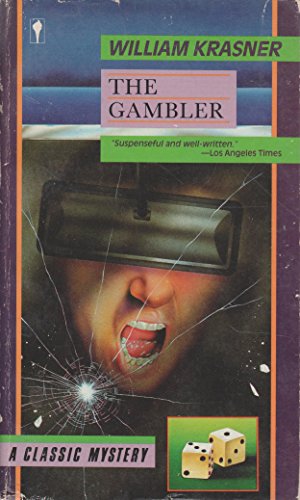Book Review: The Gambler by William Krasner
Ben Wulfson hasn’t been back to his home city in a while. He got called up during the war, and when he mustered out, Ben decided to operate in Miami for a while. Miami went sour after a while, and he did not have many other places to go, so now he’s back. Ben’s looked up his old pal Tim Coogan, who isn’t exactly thrilled to see Ben, but has to admit he’s not in any better shape. Ben Wulfson has a plan to put them both in the black.

Y’see, back in the old days, Ben and Tim were accomplices in cheating at gambling. Tim still remembers the old signals. And the “goulash”, a former Hungarian social club and restaurant, is still in business as a card game place. Tim warns that there’s new management, a big-time racketeer named Mr. Malec. But Ben’s sure he can play his cards just right to avoid notice.
And it turns out that Wulfson is indeed slick enough not to actually get caught cheating, but there’s enough suspicion for Malec to disinvite Ben and Tim from the goulash. The good news is that they’ve now got enough of a nest egg to start their own enterprise, a dice game down on Commission Row, serving the truckers and warehouse workers who bring in the city’s grocery supplies.
Ben Wulfson intends to run his craps game honestly; after all, the house always wins. But the house percentage is pretty thin, and Ben can’t keep himself from having a little insurance on hand for bad dice runs. And that’s when the trouble really begins.
This 1950 book isn’t much of a mystery; it’s more in the noir subgenre–it’s clear from the beginning that things will end badly for Ben. The city in question is never named, but it’s likely St. Louis, Missouri as that’s where the author is from, and he’s clearly drawing from hometown experiences.
We learn that Ben’s been a petty criminal since his early teens, shortly after his father went broke and died. He’s estranged from his more responsible brother Jack, who got a straight but dead end job, married, had a family, and supports Ben and Jack’s rapidly deteriorating mother. Ben drops by and promises to send money to support his mother, but then doesn’t contact the family for weeks–then is shocked to find that his mother has been placed in a rest home due to her senility without his permission.
Ben’s also picked up a young woman (she’s consistently called a “girl”) named Alice from a park bench. He’s not sure exactly why. Alice is probably suffering from clinical depression, based on the way she acts. Later on in the story, Ben also experiences similar symptoms so it may be a matter of recognizing similar brokeness. While they share a bed in a hotel room and later a tiny apartment, it’s not clear if they ever have sex. (Ben visits a prostitute before meeting Alice, and it’s clear that meeting does involve sex.)
The crisis comes about halfway through the book when a sore-headed trucker named Jake gets suspicious of the dice and starts a fight with Ben. Ben stretches the definition of self-defense, and Jake gets a head injury. Despite being in no condition to drive, Jake insists on taking the wheel of his truck, with disastrous results. Since running an illegal dice den is a felony in the state, Ben may be on the hook for felony murder. Worse, Tim runs off with the majority of their shared money.
The noir atmosphere really comes through, and the ending is grim. However, the depiction of depression is perhaps a little too realistic and makes chapters towards the end of the novel drag on.
Content note: Antisemitism. Ben is Jewish by birth, and at one point a bar patron tries to pick a fight by repeatedly slurring Jewish people, including referring to World War Two as “the Jews’ War.” Sex is implied, Ben and Alice’s relationship is unwholesome, some violence, a dog dies.
It’s an okay novel of its type, but it’s not top-rate, so it’s easy to see why it’s fallen out of print. Recommended for noir fans.

